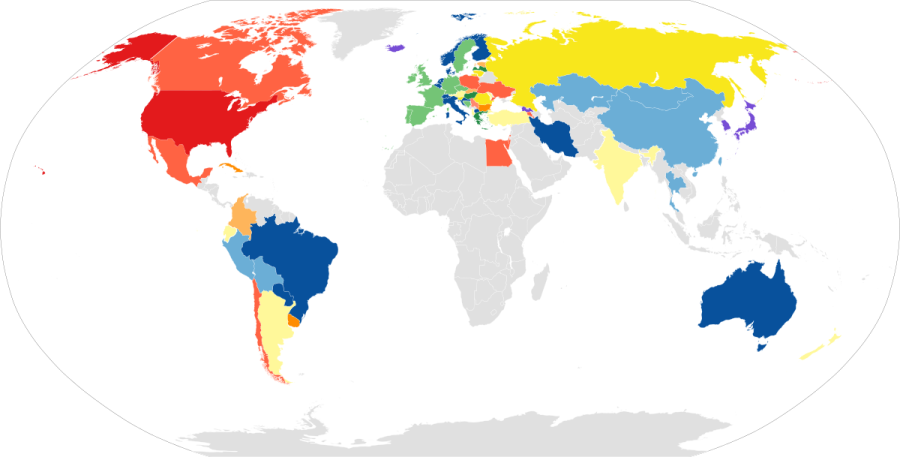View this link for the map key.
In America, tipping is not just a practice; it is a culture.
Whether it is the digital cash register at your local coffee shop beckoning you to tip 20% on an already overpriced coffee or the expectant waiter with stellar service at a chain restaurant, tipping simply feels like the right thing to do.
But if, heaven forbid, one opts out of leaving a tip, they are seen as cheap or inconsiderate.
So how did this culture come to be?
In Europe during the 17th century, the practice of tipping emerged and spread to North America in the 18th century. Tipping was a custom of the rich who wanted to appear sophisticated. Today, tipping is much less common around the world, and in many countries, no more than a 5% tip is expected – if anything at all. So why is it that in some job fields in North America, workers’ wages are dependent on tips?
McGill University’s student-run magazine, The Bull & Bear, explained, “In the U.S., most states adhere to the Fair Labor Standards Act (FLSA), originally published in 1938. Under the FLSA, employers can use tips ‘as a credit against the minimum wage.’ What this means is that instead of paying tipped workers the $7.25 national minimum wage (per hour), employers may choose to pay them as low as $2.13 in cash, and issue a maximum ‘tip credit’ of $5.12.”
Because customers are willing to pay tips, employers are responsible for a smaller portion of employee salaries.
As a server at Steel Plow Burger Company, senior Natalie Carslake is familiar with this structure. “Tips are my primary income. Without tips, my hourly wage is $4.85. This makes my income very unstable. You can never expect what you are going to make in a shift,” she shared.
Carslake explained that because it is customary to tip in America, she expects tips when serving. “I know many people I work with have the mindset that if you can’t afford to tip, you shouldn’t go out to eat. I don’t necessarily agree with that, but I do think it’s important to tip if you want to receive good service again the next time you come to eat at that place,” she elaborated.
When Carslake does not receive tips (gets stiffed), she reacts negatively. “I’ve only been stiffed a few times, but every time it happens it ruins my shift. I spend a lot of time thinking about what I could’ve done differently to avoid being stiffed, and I question my abilities as a server,” she said.
Carslake is fortunate enough to be financially supported by her parents, but she acknowledged that not everyone is so lucky. Many people at her place of work are fully dependent on tips for themselves and their families. So though it may seem insignificant, tipping – or not tipping – is no small act.
But what do consumers think?
Senior Claire Horsfield places great importance upon tipping. “I always tip at restaurants and nail and hair appointments,” she shared. “I think it’s important especially at places like restaurants because a lot of the time employees rely on tips to make up most of their salary.”
She continued, “I feel like everywhere I go now has tipping options which can be uncomfortable because a lot of places just expect you to tip regardless of the service and the amount you spend.”
While not everyone shares the same mindset as Horsfield when it comes to tipping, it seems the seemingly simple practice is becoming increasingly complex.
As McGill’s Bull & Bear put it, “[f]ar too often, tips are no longer seen as a sign of appreciation for outstanding service. Tipping has almost become a cultural obligation, an automatic gesture.”
And this can have significant implications. If tipping becomes even more of a customary practice across job fields, workers’ wages could go down, causing workers to depend on a much more inconsistent income.
As customers grapple with the decision to tip and workers continue to rely on tips for their livelihoods, the responsibility of workers’ salaries teeters between the employer and the consumer.










Maya Maynard • May 11, 2022 at 9:34 am
Well written Jayne, I liked how you got a quote from a server it really showed perspectives. Very interesting to read.